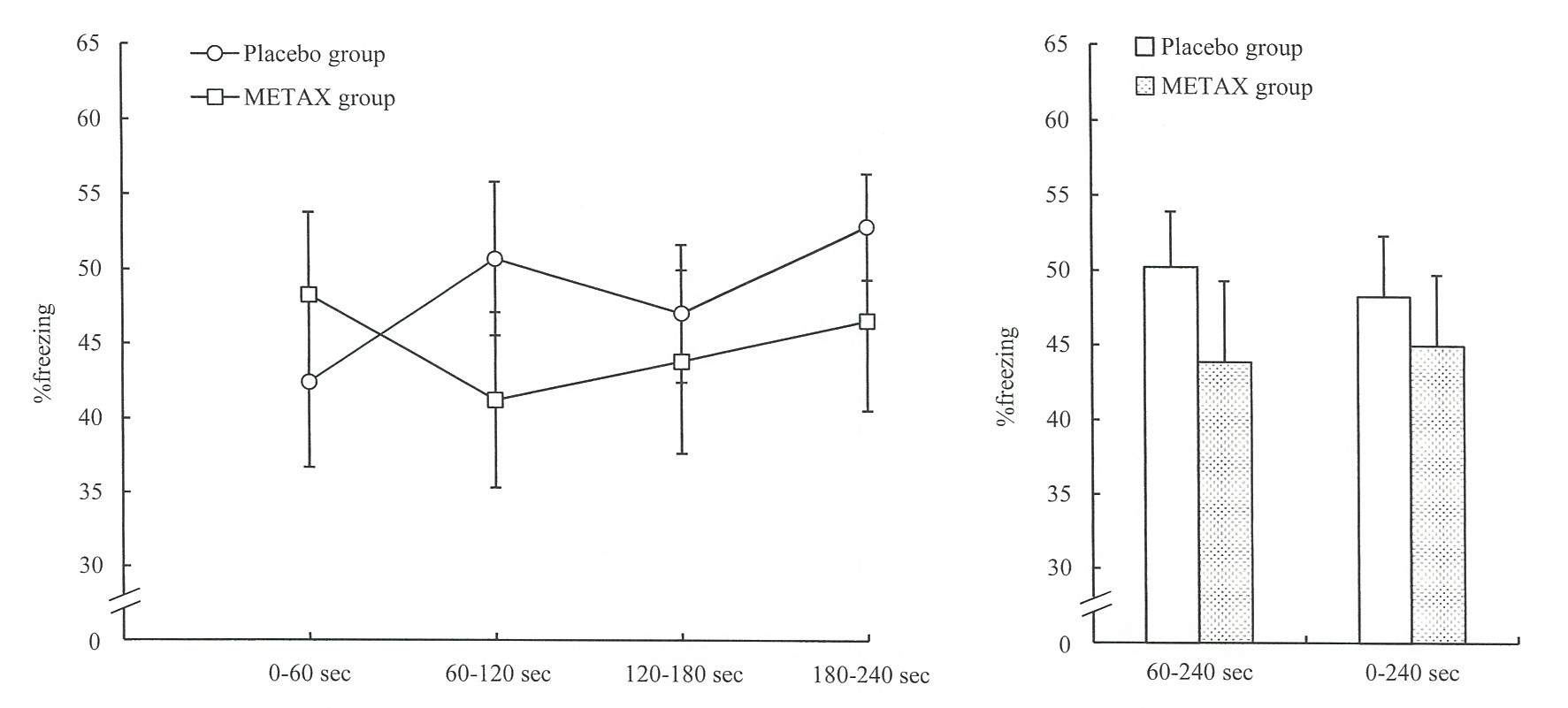July 30, 2020
Test results suggest that Phiten’s highest level technology “METAX” has anti-anxiety effect!
Phiten Co., Ltd. (Location: Nakagyo-ku, Kyoto, Representative Director: Yoshihiro Hirata, hereinafter referred to as Phiten) has conducted a test of anxiolytic effect of Phiten’s original technology “METAX”.
Phiten conducted a fear conditioning test by using mice reared for 14 days in a breeding cage equipped with Phiten’s original technology “METAX”, and evaluated the intensity of anxiety using immobility time of freezing behavior (inactivity). The results reduced 60-240 seconds of the time of inactivity, suggesting that METAX has anxiolytic effects.
METAX Technology supports your body in a relaxed state.
About Test Results
Test Subject
Examination of anxiolytic effects in fear conditioning test using METAX-exposed mice
Test Facility
Nihon Bioresearch Inc., Hashima Research Institute
Test Purpose
To conduct a fear conditioning test by using mice reared for 14 days in a breeding cage equipped with Phiten’s technology “METAX” to evaluate the anxiolytic effect using immobility time as an index.
Outline of the Study and Consideration
The anxiolytic effect of METAX, which was developed with the technology of Phiten Co., Ltd., was assessed with the fear conditioning test. The fear conditioning test is used to evaluate the anxiolytic effect. Animals are placed in a chamber and exposed to an electrical stimulus to develop a fear memory. If the animals associate the chamber with the fear memory, they will exhibit a freezing behavior (immobility state) even without the electrical stimulus. The severity of the fear can be measured by the time spent in the freezing state. In the present study, animals were housed in a cage surrounded by substances impregnated with METAX or placebos for METAX for 14 days before the fear conditioning test. On the day after the fear conditioning, freezing time was measured in the chamber for 240 seconds. Freezing was defined as the absence of movement (immobility time).
Male C57BL/6NCrl mice were used for the present study. A METAX group, which was housed in a cage surrounded by sheets and stone impregnated with METAX, and a placebo group, which was housed in a cage surrounded by sheets and stone not impregnated with METAX, were employed. Each group consisted of 10 animals.
As a result, the freezing time in the METAX group was 44.97% (107.92 seconds) in 0–240 seconds. In this group, the freezing time was shortened although no significant difference from the placebo group (freezing time: 48.27% [115.85 seconds]) was seen. No significant difference was seen in the freezing time in each 60- second time measurement. In the METAX group, however, the freezing time was prolonged, compared with the placebo group, in the initial 0–60 seconds. On the other hand, the freezing time was shortened by 6.36%pt (11.44 seconds) during the last 180 seconds (60–240 seconds) and was shorter than that in 0–240 seconds.

From the above results, although METAX did not show a significant anxiolytic effect, it showed a slight anxiolytic effect at 0-240 seconds and a higher anxiolytic effect at 60-240 seconds.
In this study, no anxiolytic effect of METAX was noted in the initial 0–60 seconds, the time immediately after the environmental change from the cage to the chamber. The reason for this fact is considered to be that METAX has a nature of exerting an anxiolytic effect by changing the cage environment to relaxing. In the METAX group, it was thought that no anxiolytic effect was noted since strong fear symptoms were seen due to the environmental change from the cage (relaxing environment) to the chamber (new environment). In the final 60–240 seconds, the freezing time was decreased although no significant difference was seen. It is possible that the freezing time would decrease more substantially after 240 seconds.
It is known that the anxiolytic effect on animals from environmental change needs more time to develop and is milder than that of drugs, which directly affect the body and skin. The housing period in the present study was relatively short (14 days), and animals undergoing this type of fear conditioning exhibit strong fear response. In fact, such animals are used in post-traumatic stress disorder (PTSD) models. Although no significant difference was seen, METAX decreased the freezing time of the strong fear mouse model in a relatively short time. This result highly suggested that METAX has an anxiolytic effect. It is considered that the anxiolytic effect of METAX will be confirmed more clearly by conducting studies with longer housing periods, with a larger number of animals, with other animal models, and with evaluation under the same environmental conditions as those of housing.
As described above, decreased freezing time in the final 60–240 seconds in the METAX group suggested that METAX had an anxiolytic effect although no significant difference from the placebo group was seen.

